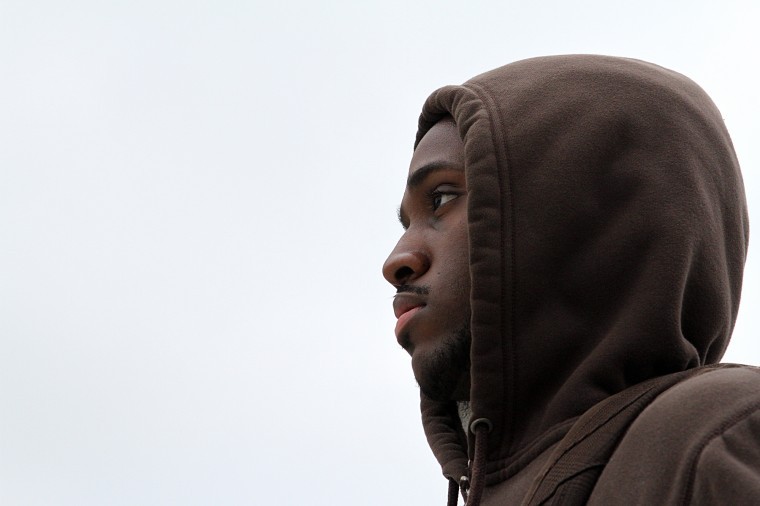Community members gather for Trayvon Martin vigil
Harold Raddle Jr., fourth year mechanical engineering major, wears a hoodie at the vigil for Trayvon Martin Friday afternoon.
April 1, 2012
Over 75 people gathered at the MLK commons Friday afternoon to remember the life of Trayvon Martin, a 17-year-old boy who was shot and killed in a gated Florida community last month. Hoodie-filled vigils for Martin like this one have occurred around the country.
“It was just shocking that an innocent kid was killed and nothing happened,” said retiree Norden Gilbert, who worked in the NIU legal office. “Once that word got out, people responded.”
Senior history major Nina Cunningham stood just steps away from a cross bearing a picture of Steven Agee II, a NIU gun violence victim, as she started the vigil for Martin.
“People keep asking me why I’m doing this,” Cunningham said in her speech. “Why have I spent night after night calling people and Facebooking people and crying as if Trayvon Martin were my son? It’s because Trayvon Martin, to me, is my son.”
Cunningham told the crowd she was careful not to mention race in her opening speech because the situation with Martin is much bigger than race: It’s about justice.
“We seem to have lost our way,” Cunningham said. “We seem to have lost our way when a murder victim is given a drug test, but the murderer isn’t even given a gun powder test or his clothes aren’t taken into evidence.”
After Cunningham was finished, Pastor Jerry Wright, from Rock Christian Church in DeKalb, took the stand. He said when someone sees injustice, they should respond. He said one way to do that is to vote. During the vigil, attendees were given voter registration papers.
“When we talk about combining this with a voter registration drive, we’re talking about something that gives you a voice, so that people can hear you. You don’t have to yell in front of their faces, they can hear you speak from your vote,” Wright said. He recalled something his sister once said: “‘Evil is allowed to triumph when good folks are silent.’”
During the vigil, many spoke of the troubles they face in today’s society. Wright said it’s not easy for him to raise his six black sons because they’re born a “threat.”
“A threat either to be brilliant, a threat to be a criminal, a threat to come into somebody’s home, or a threat to use their brilliance in ways that nobody could even imagine,” Wright said.
Larry Bolles, director of Community Standards and Student Conduct, attended the vigil and said he also has a black son. Bolles said his son sometimes visits predominately white Chicago neighborhoods. After Martin’s death, Bolles said relatives suggested he should keep his son out of those neighborhoods.
“What do you mean?” Bolles said. “Those are some of the best neighborhoods in America.”
Cunningham said her 15-year-old son, Malique Cunningham, recently asked to run outside. She said she told him no because she fears that if neighbors saw him running around their neighborhood, they could misinterpret the situation and call the cops.
“Like Trayvon Martin’s mother, and so many other mothers, I fear what the world sees, because the world doesn’t always see what I see,” Nina said. “I wonder what people see when they see my son.”
Later in the vigil, Malique took the microphone to explain how it feels to be a black teenager. He recalled an evening when he and his younger brother were playing with a water hose in their backyard. Malique said neighbors called the police and reported two suspicious black males playing in someone’s backyard. When the police showed up, his parents had to explain it was their house.
“That’s when I started to realize that I really can’t do everything that all my other friends do,” Malique said. “It hurts to realize that I could be the next Trayvon Martin, just wanting to jog in my own neighborhood.”
After the vigil was done, Nina said she wished the number of people who came was larger, but she really appreciated those in attendance. She said there was a lot of passion that evening, and she loved that.
“It shows there’s still hope,” Malique said.







